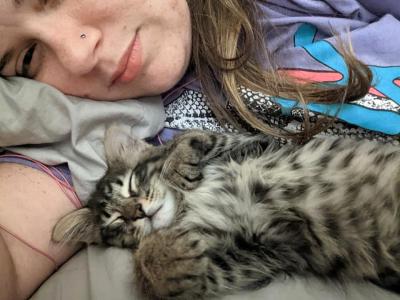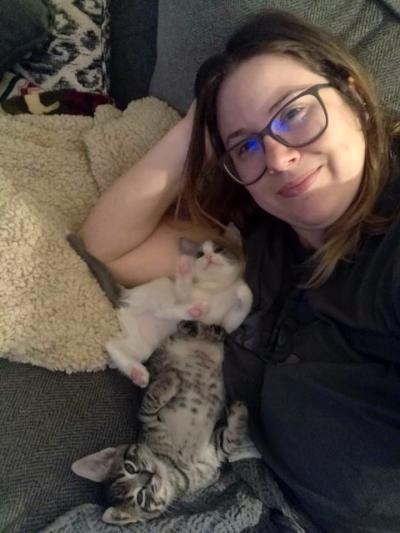Inspiration from a kitten foster volunteer

Best Friends takes in a lot of kittens each year, and this summer is an especially busy one. Thank goodness for volunteers like Jennifer Ronzello, who since 2019 has not only fostered dozens of cats and kittens, but she has a track record of turning things around for scores of fragile kittens needing intense care.
“Jennifer is amazing,” says Deyra Galvan, Best Friends community engagement coordinator in Houston. “She has a gentle touch with the most vulnerable kittens and is a bottle baby hero.”
She’s just the kind of hero needed now: It’s the height of summer kitten season when shelters everywhere, including Houston, are inundated with newborn kittens. Jen’s passion for helping kittens in need runs deep, and even though she works full time, maintains an active lifestyle and was recently married, she always makes time for the kittens.
Here’s more from Jen on what she loves about fostering cats and kittens, and why she hopes you will, too.

What inspires you most in your volunteer work?
I kind of fell into rescue about 10 years ago. I lived in a rural area and stray cats would find their way to my house. I was feeding them, vetting them and getting them spayed and neutered. I found adopters for the friendly cats. But it got a little overwhelming for me financially.
So, I reached out to a rescue in my hometown. They offered to let me utilize the vet clinic they partnered with, so I was able to get vetting done at deeply discounted rates. I still had no idea how overwhelmed shelters and rescues were, but I knew how important it was to spay and neuter pets.
After that, the founder of the rescue asked me to foster some kittens. I jumped at the chance! I loved kittens but had never been around them much. And once I saw how desperate the situation was in shelters, I knew I had found my calling. There was no way I could ignore the issue now that I was aware of it.
Why did you decide to volunteer to help animals and what motivates you to keep going?
I've been working with cat and kitten rescues for over 10 years now. I fostered with several organizations before I settled in with Best Friends. Best Friends is well-organized, which is wonderful because it allows me to focus solely on caring for the kittens.
[Why kittens need us more than ever]
(The team) has made sure that I haven't burned myself out by overextending myself. I find it impossible to say no when I'm asked to care for a kitten, and that's gotten me in trouble in the past. The foster team has made sure that doesn't happen. They care greatly about the mental health of their volunteers, and I've never felt like they've asked too much from me. I've never felt compassion fatigue since volunteering with Best Friends.

Since becoming a volunteer, what have you learned and do you see anything differently now?
I see things very differently now. I used to get frustrated by people who let their pets breed. But I've learned to be a little more diplomatic and understanding over the years. Not everyone has access to the resources needed to properly care for their pets. Lots of people aren't even aware that there are opportunities for them to get help with their pet care. I remember when I first got involved in rescue, I had no idea just how dire the situation is in shelters and rescues.
In the years you have been caring for cats, what are you most proud of?
I've learned so much about kitten care. Everything you read on paper sounds very straightforward when it comes to kitten care. But the reality of it is much more complicated and nuanced. I can't even put into words how grateful I am to the foster team and medical team at Best Friends. They've always been so supportive and it's allowed me to build skills to help the most vulnerable kittens.
[Fast action saves two kittens on the brink]
I remember fostering a very sick two-week-old kitten with an upper respiratory infection a couple years ago. I tried so hard to get her to latch (onto the bottle) so I could feed her. I remember being so frustrated with myself because I didn't have the knowledge or skill to help her. I remember texting Deyra: "I wish I knew how to tube-feed."
Not long after that, the medical team got me tube-feeding supplies and showed me how to use them. Tube-feeding is the most useful skill a person caring for neonatal kittens could learn. I've been able to tube-feed several kittens since then, which has definitely allowed me to save kittens I wouldn't have been able to save.

What are you doing when you’re not volunteering with animals?
When I'm not volunteering, I love to travel with my husband. I'm a scuba diver, so we typically travel to the Caribbean so I'm able to dive. But my husband and I know to never plan trips during kitten season! We save most of our travel for the winter. I also play video games. My office doubles as a kitten room. My gaming PC sits right next to my kitten incubator.
Tell us something we might not know about you.
Fostering and volunteering are very important to me. It's the most fulfilling part of my life because I get to see the impact I'm having. Thinking about the pet overpopulation problem is heartbreaking, and although the impact I'm having is relatively small, I am helping.
Tell us about your own pets.
I have four of my own cats and, of course, they're all foster failures! One is our orange tabby, Parker. He's a challenging cat … way too smart for his own good and is constantly getting into trouble and making messes. He bonded very strongly with my husband, Tim. We weren't planning on keeping him, of course. He was the most social of his litter (or so we thought).
[Kitten who once needed extra TLC becomes resident kitten ambassador]
Because he was the most outgoing and friendly in his litter, we placed him at a pet supply store for adoption. I got a call a few days later because he wasn't doing well there. Apparently, he was hissing at people who came to meet him. I remember thinking that they must have him mixed up with another cat. He’d never hissed at anyone in his life.
Sure enough, when I showed up to the pet store, he was not being friendly at all. So, we took him back home with us, and he immediately perked up and turned into his usual sweet, outgoing self. So, we think Parker played us for fools because he wanted to stay our cat forever. And he got his way!

What does volunteering mean to you and why do you do it?
It's stressful to be the go-to kitten person with my friends and family because I can't always help them as much as I'd like. But I do enjoy being able to share my skills and offer advice when I can. It feels great to have confidence in my skills and abilities, and to know that I'm prepared to give a sick kitten its best chance to survive. The staff at Best Friends has helped me develop those skills, and I'm beyond grateful for that.
Tell us about your favorite volunteer moment.
One of my favorite parts of fostering kittens is when my friends adopt my foster kittens. I love it because I get to see the kittens grow into beautiful, healthy, happy cats. It's amazing to see pictures of them all grown up.
What would you tell others who are thinking of becoming volunteers?
I'm always very encouraging to anyone who asks me about rescue, which happens a lot since I'm the resident kitten person in our social circles. But I also try to be realistic when talking to someone about getting involved. It can be emotionally draining.
Sometimes it feels like what I'm doing is futile … but then I look back at the photos of the kittens I've fostered. I remember every one of them. Thinking about how I've been able to impact the lives of the cats and kittens I've fostered reminds of why I got into rescue in the first place. I saw that help was needed, so I just helped.

Kittens need your help
Sign up with your local shelter to foster kittens and help save lives during kitten season.